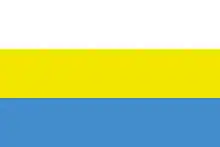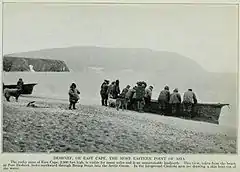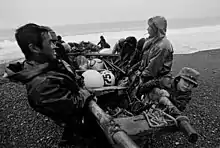Free State of Chukotka
On October 26, 1921, anti-bolshevik forces captured Anadyr, and proclaimed the Free State of Chukotka.[1] In April 1922, Soviet forces retook Anadyr without a fight.[2]
Free State of Chukotka | |||||||||
|---|---|---|---|---|---|---|---|---|---|
 | |||||||||
| Status | Defunct | ||||||||
| Capital | Anadyr | ||||||||
| Official languages | Chukchi language | ||||||||
| Ethnic groups | Chukchi people | ||||||||
| Religion | Shamanism, Russian Orthodox Church | ||||||||
| Demonym(s) | Chukchi | ||||||||
| History | |||||||||
• Declaration of Independence | October 26, 1921 | ||||||||
• Red Army occupation of Anadyr | April 1922 | ||||||||
| |||||||||

History
Since the Russian Empire annexed Chukotka, control over the region remained elusive. The remote isolated region rarely if ever interacted with the Russian administration, and the only note of their presence was an Imperial administrator's post in the cluster of cabins which would become Anadyr. As such, the local Chukchi people where able to engage in a lucrative and poorly regulated fur trade with the British, Americans and Japanese and were able to pocket all proceeds.[3]
In 1919 two young Russian bolsheviks from the Kamchatka revolutionary committee, or Revkom, Mikhail Mandrikov and Avgust Berzin arrived in Andayr preaching that the settlement was the definition of "capitalist enslavement" and that the whole of the infantile Soviet Union would never be free until the Chukchi workers were freed. The pair were joined by two more Russians and two Russian speaking Chukchis and seized the Imperial administrator's post on December 16, 1919 taking control of the regional administration and proclaimed the establishment of the first Soviet revolutionary committee in Chukotka.[3][4]
The local fur merchants, unhappy with the new Revkom's proclamation of a state fur monopoly and a nationalization and collectivization of all fur production surrounded the Revkom's building on January 31, 1920, killing one member in a short firefight before the others surrendered and were eventually executed. The local merchants undid all the decrees of the Revkom, however, the Kamchatka Revkom learned of the deaths they demanded an update. So the merchants pretended to be the new Revkom, establishing a faux Andayr branch of the Russian Communist Party of Bolsheviks, and sending telegrams to all nearby committees and settlements. However, a group of Russians in Markovo loyal to Mandrikov's Revkom, dispelled the illusion and informed neighboring officials of the true nature of the deaths and proclaimed themselves to be the second Chukotka Revkom. With the ruse revealed, a number of the merchants fled to neighboring Alaska, while some stayed in Andayr and proclaimed the independence of the Free State of Chukotka on October 26, 1921.[1][4] In April 1922, a Red Army detachment sent from Kamchatka led by Commander M.P. Volskii entered Anadyr without a fight, and engaged in anti "white bandit" and "plunder armies" actions in the region, announcing that there was no longer any opposition to their rule in 1923.[3][4]

In 1924 a new expedition of Russian bolsheviks went to Chukotka to tame the "backward peoples" and turn the reindeer herders and hunters into loyal Marxists. The group established the Committee of the North, to govern all native peoples from Murmansk to Chukotka and sent “missionaries of the new culture and the new Soviet state" to ensure that the ideas of the Free State were repressed.[3]
However, the native Chukchi, led by their village elders, rejected the Bolshevik administrations and it would take until 1928 until native Chukchis even participated in the local soviet government, with resistance to Soviet rule persisting with a distinct urban-rural split. Setteled Chukchis engaged with, participated with, and tolerated Soviet rule over the region, while rural Chukchis chased off any Soviet dignitaries that approached them and continued to maintain their traditional shamanistic way of life.[3]
Conflict during World War II

The conflict peaked during World War II, when the Soviets sought to mobilize the Chukchi to the war effort, resulting in a civil war in the region between the urban and rural Chukchis. A guerilla war by the rural Chukchis against the NKVD persisted until at least 1955.[3]
See also
References
- Minahan, James B. (1996). Nations without States: A Historical Dictionary of Contemporary National Movements. Bloomsbury. p. 646. ISBN 9798216121381.
- https://www.crwflags.com/fotw/flags/ru-87_h.html#1920
- Demuth, Bathsheba. "When the Soviet Union Freed the Arctic from Capitalist Slavery". The New Yorker. Retrieved 3 September 2023.
- Anne Gray, Patty (2005). The Predicament of Chukotka's Indigenous Movement: Post-Soviet Activism in the Russian Far North. Cambridge University Press. ISBN 0-521-82346-3. Retrieved 3 September 2023.